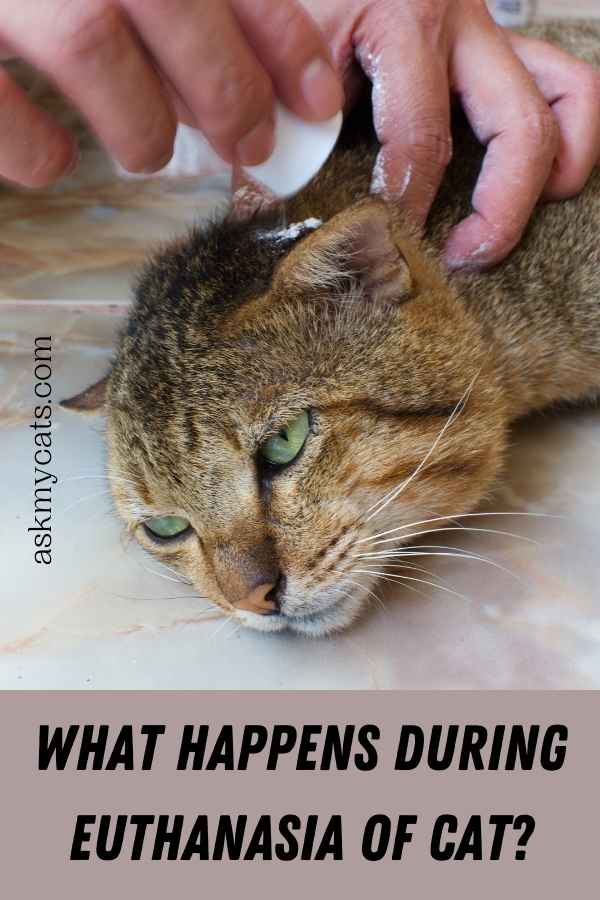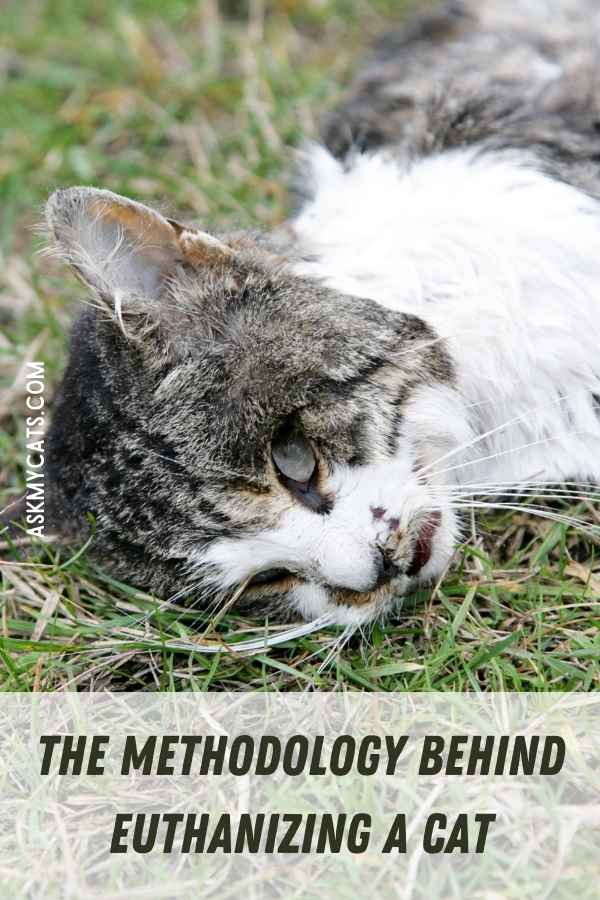Verified & Fact-chaked by Dr. Nele De Schryver(Small Animal Veterinarian)
Cats do not have the same lifespan as humans. Euthanasia – simply, a “gentle and quick passing” – is something no cat owner wants to think about, but it is a choice that many cat owners must make at some point.
If you’re thinking of humanely euthanizing a healthy cat, keep in mind that rehoming may be a safer idea.
Ask the veterinarian for advice; several can assist with behavioral issues and can provide tips on rehoming.
It is not advisable to humanely euthanize your cat in your own way because we need to remember that they are our pets and they deserve to be treated well at the end of their life. Their love and affection have earned them more than a bullet to the head. Also, it is completely illegal in most countries and you might go to prison for it!
Key Takeaways
- Euthanasia is a difficult decision that many cat owners must make. It is a procedure to relieve pain and suffering at the end of a cat’s life.
- Reasons for euthanasia may include terminal illness, poor quality of life, and inability to rehome due to behavioral issues.
- In-home euthanasia is a popular option, with many veterinarians and agencies offering the service.
- The process typically involves sedation and then the administration of a lethal dose of anesthetic.
- It is important to consult with a veterinarian and consider all options before making a decision on euthanasia.


Give Your Cat the Perfect Day
Get the Free Ebook!
What Is The Concept Of Cat Euthanasia?
Euthanasia = good death, mild death, merciful death
The definition of the term encapsulates the justification for the procedure: to relieve more pain and misery at the end of life.

Weak quality of life, terminal medical problems, unrelenting suffering, failure to re-home a pet due to serious behavioral/safety issues, caregiver burnout, and so on are only a few of the reasons veterinarians conduct euthanasias.
Each pet and case is unique, and a veterinarian will also assist you in determining if your pet is a candidate for euthanasia depending on their health.
When there is nothing that we can do to save the cat, euthanasia is a mechanism we can use to put an end to the pain.
While many of my clients feel bad about humanely euthanizing their pets, it is considered a compassionate, merciful, and loving gesture.
If you’re thinking about euthanizing a healthy cat, rehoming may also be an option.
Some pets can experience unbearable suffering if they are not euthanized, and others may lose track of who they are and where they are.
During heart failure, some cats would be unable to walk, and others would drown because of the fluid accumulation in the lungs.
As a pet parent, you have to consider spending less time with your cat if it means it would have a bad life quality. There might be a solution to get a bit more time, but it would mean your cat might suffer unnecessarily.
Is It Advisable To Euthanize Cat At Home Without a Vet?
It is generally not advisable to euthanize a cat at home without the guidance of a veterinarian.
Euthanasia is a serious and difficult decision, and it is important to have the support and guidance of a veterinarian to ensure that the process is carried out humanely and safely.
Additionally, a veterinarian can provide guidance on pain management and other important considerations.
If you are considering euthanasia for your cat, it is important to consult with a veterinarian to discuss all of your options and determine the best course of action.
Interesting Read: Is It Legal To Euthanize A Healthy Cat?
Who Needs To Perform Euthanasia Of Cat At Home?
When it comes to in-home euthanasia, there are many alternatives available. The first is your neighborhood veterinarian.
Since they have a physical location, several veterinary hospitals can assign a veterinarian to your home if you order it.
Veterinary agencies that send veterinarians to offer in-home consultation and euthanasia for pets are another choice. One corporation has a national footprint, while the rest are more focused on a state or local level.
A few companies with wider coverage areas are listed below, but you can also Google “in-home euthanasia” to see what services are available in your area.
Must Read: When To Put Your Cat Down?
Why Can Euthanasia of Cat Be Perform at Home?
Is it better to humanely euthanize your dog or cat at home? I believe so, but you should consult someone you know and trust who has been through the process.
If you meet someone who has had both veterinary hospital euthanasia and home euthanasia, your viewpoint is much better.
If you need more details, visit the pet hospice pages or contact their customer service representatives.
There are many online articles that you can read as well. Any person I’ve spoken to who has had an in-home euthanasia procedure said they will still get it done at home in the future.
Interesting Read: Choosing the Right Euthanasia Option: At-Home Vs. Vet Clinic
How Is Euthanasia Performed On Your Cat?
First, a sedative is given into a muscle, usually in the hind leg or the back muscle, so that the cat doesn’t feel any more pain right away and so that the side effects of the anesthetic that follows are minimal to none.
This injection can be a little painful because this product stings a bit, but this pain is very short. It is only felt in the moment it is given.
When the cat has eaten before this, it is very likely it will vomit at this time. So a ‘last supper’ isn’t such a good idea because it is very unpleasant for you and your cat. It also takes longer for the sedative to have an effect when the cat is not sober.
After that, an overdose of anesthetic is injected into a vein or other parts of the body, like in the kidneys for example.
At times, after the anesthetic is given, your cat may twitch and tremble. This is however very rare when a sedative was first given and your cat is highly sedated at this time and doesn’t feel or experience any of it.
The breathing stops after a few minutes, then the heart ceases beating. Death happens.
Find Solution: My Cat Is Dying And I Have No Money!
How To Put Down A Cat Without An Injection?
Euthanasia medications like pentobarbital can be inserted into a heart or body cavity directly if the intravenous injection is not necessary.
As intraperitoneal (although it can take up to 15 minutes in dogs and cats) is entirely permissible, only a highly sedated or unconscious animal should be injected with an intracardiac injection.
Carrying out IC injections in areas of humane animal care legislation on a completely aware animal is also a criminal offense.
Must Read: How To Euthanize A Cat With Over-The-Counter Drugs?
What Happens During Euthanasia Of Cat?

Take some time off work to recover from the incident. You will usually pick a private period for your visit to the surgery if you explain the condition to the receptionist before you make the appointment.
It could be a smart idea to have a friend or family member along for moral support. If you choose, certain veterinarians will come to your home.
If your pet is still in the hospital, you can request a visit and say your goodbyes.
If your cat is under anesthetic, though, agreeing to euthanasia without waking him and perhaps seeing him afterward might be kinder.
A brief explanation of the procedure follows.
Any of the events mentioned can be upsetting, but keep in mind that your cat may quickly lose consciousness and may no longer be able to sense pain.
Normally, you will be asked to sign a consent form. The most common method of euthanasia is to administer an overdose of anesthetic into the vein of the front leg, but the injection may also be administered to other parts of the body.
A nurse holds the cat as a little patch of hair is trimmed off. Your pet can just notice a slight prick from the needle, and the injection will be painless.
Also Read: Where To Euthanize A Cat For Free Or Cheap?
A cat can sometimes make a slight scream as the injection is administered; both anesthetics trigger a fleeting sense of dizziness as the treatment takes effect.
Unconsciousness occurs quickly, even before the injection is completed. When the heart ceases pounding, death happens in a matter of minutes.
If the animal is sick or has low breathing, it might take a bit longer. It may be impossible for the veterinarian to locate a vein in these situations.
If a cat is agitated or restless, the doctor can first administer a sedative, but locating a vein may be difficult, and the injection can take longer to operate.
You may notice reflex muscle activity or involuntary gasps in the minutes after death. These are not symptoms of life; rather, they are death-related reflexes. The eyes are normally open, and the bladder sometimes empties.
The vast majority of euthanasia goes easily and fast, with the animal suffering nothing. And if there are complications, it is always a simple operation that will spare your cat several days or weeks of agony and a painful end.
Interesting Read: Should I Stay With My Cat When It Is Euthanized?
our Recommendation
Honor your beloved feline companion with a beautiful cat memorial from Cat Memorials & Funerary.
Check out the best memory you can have of your cat.
Is It A Token Of Pain Or Creeping Of Age?
Still consult your veterinarian on this. Do not be hesitant to see a veterinarian as soon as possible. Many “late age” symptoms, such as arthritis, may be alleviated.
It’s possible that your cat’s issues are treatable, and early care prevents pain.
Cats do not often whine or yowl while they are in distress. Even veterinarians find it impossible to assess long-term suffering when animals (and people) change their behavior to cope.
The other option is to try painkillers (only those prescribed by a veterinarian) to see how your cat improves.
A change of behavior, a lack of appetite, a refusal to play or walk about, or whether your cat is not cleaning or grooming could indicate that your cat is in discomfort.
If your cat is agitated and can’t seem to settle down, is sitting or lying in an unusual way, is anxious or withdrawn, or has just lost interest in life, it may be a symptom of discomfort.
Do consult your veterinarian on your cat’s complaints, since they may be exacerbated by issues other than discomfort.
Check out my cat is dying how long will it take
Making The Call To Put Your Cat To Sleep
Is it possible for your cat to feed, drink, sleep, and walk around in a reasonable amount of comfort?
Does he or she recognize your presence and extend a greeting?
Is it true that feeding time piques the cat’s interest?
Euthanasia should be addressed whether there is a persistent and incurable failure to feed, fatigue, symptoms of pain, anxiety or irritation, or trouble breathing.
Since you and your family know and love your cat better than anybody else, make an informed decision about its quality of life.
Your veterinarian will assist you with this and can also make a suggestion. Having a time limit might be a good idea if you want to see if your cat’s health improves.
Sadly, few cats die happily at home while sleeping. Most people hit a point where their quality of life is unsatisfactory and they must consider euthanasia.
It can be physically exhausting to have a chronically sick cat. Treatment also necessitates a significant time investment.
Not every owner can cope, and if there is no hope of the cat getting better and you are unable to provide your pet with the level of treatment needed for a stable life, euthanasia could be the better choice.
There is the risk of a rapid and spontaneous decline in certain invalid cats. If you are unable to pay for emergency treatment for your pet, euthanasia could be a safer choice.
Must Read: How To Deal With Regret And Grief After Putting Cat To Sleep?
OUR Recommendation
If you are struggling with the loss of a beloved pet, Check out this An Easy To Follow Guide That Will Show You Exactly What To Do To Cope With Pet Loss
Should You Stay With Your Cat During The Euthanasia?
This is all up to you.
It might be reassuring to learn that euthanasia is normally a simple and painless procedure. If you can’t watch, don’t feel bad about it; if you’re anxious or stressed, your cat might be as well.
Veterinarians and nurses want to work with animals because they want to protect them.
And if you are not there, you can rely on them to treat your cat with compassion. After that, if you like, you can ask to see your cat. You will most likely be given the chance to spend some time alone with your cat at the end.
Also, check out rigor mortis in cats
After Cat Euthanasia, What Happens?
The majority of people prefer cremation, which is arranged by a veterinarian.
Normally, this is done in a group cremation of other cats, although you may request the ashes be retrieved, but this could be costly.
There are pet cemeteries in some countries (not all) that vets normally know about, or you can take the cat home and bury it yourself. (but depending on where you live, that might not be legal.)
If you’re not sure, vets will normally store the body until you think about it.
Don’t be shy about asking if you should hold a strand of hair or have a ritual such as saying a blessing – vets are accustomed to such demands and would be compassionate.

It’s normal to be sad when your cat passes away. After all, the cat is a much-loved part of the household.
Do not be ashamed to express your feelings; the veterinary team expects you to be sad.
It takes time to recover from the loss of a loved one, and while responses vary, depression, isolation, and indignation are often experienced.
Avoid feeling bad or blaming yourself; the decision to humanely euthanize your pet was made with your cat’s best interests in mind in order to prevent pain. It is the very last kindness you can give to your cat.
Many people had second thoughts on whether or not they did the right thing. It’s normal to have any reservations, but this will pass with time.
When you come home, expect the house to feel abandoned. Make an effort to cherish your memories and communicate with family and friends.
Consult your veterinarian if you have any concerns about your cat’s health. Parents, mates, and co-workers who have never had a special bond with an animal can be unsupportive or make unhelpful remarks.
Must Read: Alternatives To Euthanasia For Terminally Ill Cats
It may be particularly distressing for infants since it could be their first encounter with death. Tell them the truth about what’s going on and, as far as possible, include them in the decision-making process.
Funerals, creating a memorial, or putting together a scrapbook of memories of the cat can all be beneficial rituals.
Expect to be asked about death and its finality. The death of a pet may be especially painful for children, since your cat may be the family member to which they feel nearest.
The death of a cat can be traumatic for young people who are dealing with other problems in their life, so it’s a good idea to seek psychological help.
Other cats can note and react to the loss. For one or two days, they can feel unsettled and lose their appetite. If they see the corpse of the dead cat, it might help. Giving them extra care might help them feel better.
Some cats even flourish afterward because they experienced a lot of stress from the cat that is now gone. Either because they never truly got along or because it felt that the other cat was sick and in pain.
You would also like to check out how long does it take for a cat to decompose
How To Be Prepared For Humanely Euthanize A Cat?
It can be done at home or at the clinic of a veterinarian. It’s best to search first because not all veterinarians can do this at your house. You should look for one that provides this service.
Set aside days for the whole family to utter their final goodbyes. When you have youngsters, explain what’s going on ahead of time so they can brace for their friend’s death.
Bring your pet’s pad, or a comfortable blanket or towel, to the vet’s office if you want them to relax. A blanket from home could be more comforting to your pet than one provided by the vet.
Interesting Read: Did I Put My Cat To Sleep Too Soon?
The Methodology Behind Euthanizing A Cat

You may like to stay with your buddy so you can pet and console them while the veterinarian administers the prescription.
Before administering the euthanasia drug, several veterinarians administer a sedative to the cat.
The veterinarian will explain what they’re doing and when the shot will be delivered.
Some veterinarians only use sedatives whether the pet is scared or unable to sleep. The shot can cause some discomfort, and the medication can cause side effects.
So check with your veterinarian to see if it’s appropriate for your cat. They do not need it if they are really ill and already silent or have trouble breathing.
Pentobarbital, a seizure drug, is the most popular euthanasia medication used by veterinarians. It easily leaves the pet unconscious in large doses.
It normally takes one to two minutes for their heart and brain processes to stop working. It’s normally administered by an IV in one of their thighs.
It’s possible that your pet’s eyes will not shut completely until they die. Urinating or defecating is a possibility.
You may see them twitch or take one more breath. This may be surprising at first, but it’s a natural part of the operation. Your pet is not in any discomfort. This move is less likely if you use a sedative.
Interesting Read: What Are The Different Methods Of Cat Euthanasia?
Frequently Asked Questions
Can I put my cat to sleep at home?
Putting a Cat or Dog to Sleep in Your Own Home Rather than taking a frustrating car ride and standing in a medical hospital waiting room, you can get your cat or dog euthanized in the privacy of your own house.
Can you let your cat die at home?
Though it is not necessarily feasible or advisable for your pet to die at home, it can often be done gracefully. When it comes to death and dying, one size does not necessarily suit anything, as Kitty’s story demonstrates.
What do you use to euthanize a cat?
Pentobarbital, a seizure drug, is the most popular euthanasia medication used by veterinarians. It easily leaves the pet unconscious in large doses. It normally takes one to two minutes for their heart and brain processes to stop working. It’s normally administered by an IV injection in one of their thighs.
Interesting Read: Did My Cat Know He Was Being Put To Sleep?
Final Words
Euthanasia is normally conducted by a veterinarian, although it may also be handled by a qualified technician under the veterinarian’s guidance in certain instances.
The treatment entails injecting a barbiturate anesthetic (sodium pentobarbital) into the pet’s brain, which, according to the AVMA, will cause loss of consciousness and death without inducing discomfort, panic, fear, or apprehension.
Sodium pentobarbital is noted for its fast and consistent action. Until administering the lethal injection, certain veterinarians can give the patient a slight sedative.
Let us know in the comments section below if you had previous experience with euthanizing a cat!
Know more details: How Much Does It Cost To Euthanize A Cat?
You Might Also Like To Read:
- When To Euthanize A Cat With Cancer?
- When To Euthanize A Cat With Seizures?
- When To Euthanize A Cat With IBD?
- When To Euthanize A Cat With Kidney Failure?
- When To Euthanize A Cat With Feline Leukemia?
- When To Euthanize A Cat With Heart Failure?
- When To Euthanize A Cat With FIP?
- When To Euthanize A Cat With FIV?
- When To Euthanize A Cat With Dementia?
- When To Euthanize A Cat With Arthritis?
- When To Euthanize A Cat With Hyperthyroidism?

My cat has this ugly groth on his back every week it gets biger and more painful. Hes 23 years old.i want to put him down at home what would i get over the conter drugs what kind i want him to go fast and painless.
Hello,
I would suggest you to consult with your vet first before making any decision.
It is $325 or more for home euthanasia here, no cremation etc, that is an additional $200 , and a gas surcharge. That is the minimum. Restricted income has made this already heart crushing event unbearable. Beloved kitty continues to suffer.
My cat Cheeto is 24 years old. He has stopped eating and drinking almost a week ago. He has lost the ability to walk but still tries. I know it’s time to put him down. It’s so hard to see him like this. I don’t have the money to take him to a vet or have someone come to my home. What can I give him to end his suffering. I have phenobarbital 32.4mg for myself and benadryl but I don’t know what dosage. Also since he isn’t drinking water will it help him pass peacefully? Please help me help him.
Cats with no medical condition sometimes show signs of loss of appetite due to their picky eating habits.
Antibiotics can be prescribed if an infection is diagnosed.
If your cat has seizures or is anxious, the medicines you mentioned can be used to keep them under control.